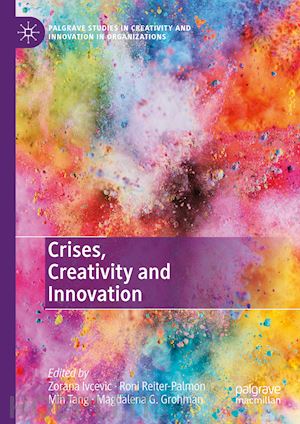

Questo prodotto usufruisce delle SPEDIZIONI GRATIS
selezionando l'opzione Corriere Veloce in fase di ordine.
Pagabile anche con Carta della cultura giovani e del merito, 18App Bonus Cultura e Carta del Docente
This book aims to provide a better understanding of the different practices of creativity and innovation under crisis situations. Drawing on theories and studies by scholars in psychology, education, and organizational behavior, this edited collection brings together renowned international experts to explore the active and reactive adaptations to the transformations caused by crises. It discusses how abrupt changes in personal, social, political, economic, or environmental affairs are an integral part of our individual and social lives, which drive people and organizations to adapt and change.
With flexibility, adaptability, and problem-solving at the core of its nature, creativity and innovation have the potential to help people cope with harsh and uncertain circumstances caused by crises. This book delves into the positive relationship between the experience of crisis and creativity and innovation, presenting theoretical inquiries, empirical studies, and their practical implications for a constructive shift in crisis management, coping mechanisms, and individual and societal wellbeing. A must read for researchers in psychology, philosophy, sociology, economy and politics, interested in crisis and disaster studies.
1. How Crises May Relate to Creativity and Innovation? An Introduction.- 2. Conflict, Creativity and Crisis.- 3. Novelty and Usefulness Are Not Enough: What Matters More Is Creative Quality.- 4. Ways out of the crisis: Mapping Possibility Spaces.- 5. Creative Agency in Crisis: Ten Questions, Ten Answers.- 6. Clamming Up or Opening Up During Crises: What Makes People Antisocial Versus Prosocial as a Basis for Creativity?.- 7. Big Challenges and New Solutions: When Students’ [Unpleasant] Feelings Are Used for Good.- 8. Resilience, Creativity, Crisis and Innovation: The use of art making during the Covid-19 Pandemic in an international summer collaboration for art therapy students in Mexico, the US, and Israel.- 9. The Crisis of Misinformation and Dark Creativity.- 10. Leading for Creativity and Innovation During Crisis.- 11. Navigating the new globalization crisis through innovation and change management: An examination of the STRA.TECH.MAN–R.A.S.I. framework.- 12. SMEs COVID-19 Experiences through a Liminality Lens.- 13. How to Open the Window of Opportunity to Social Innovation in Response to Crisis? --- Case Studies from China.- 14. Creativity and Crisis: From Possibilities to Making Them Happen.
Roni Reiter-Palmon is Varner Professor of Industrial/Organizational (I/O) Psychology and the Director of the I/O Psychology Graduate Program at the University of Nebraska at Omaha, USA, where she is also the Director of Innovation for the Center for Collaboration Science. Her research focuses on creativity and innovation in the workplace at individual and team level, development of leadership and creative problem-solving skills, and leading creative individuals.
Zorana Ivcevic is Senior Research Scientist at the Yale Center for Emotional Intelligence, USA. She studies the role of emotion and emotion skills in creativity and is Associate Editor of Psychology of Aesthetics, Creativity, and the Arts, and the International Journal of Creativity and Problem Solving.
Min Tang is Professor of International Management and Director of the Institute for Creativity & Innovation at the University of Applied Management Studies, Germany. She is the initiator and manager of a series of intercultural and interdisciplinary projects about creativity and innovation and a member of the American Psychological Association Division 10.
Magdalena G. Grohman is Clinical Associate Professor in Design at the Department of Multidisciplinary Innovation in College of Applied and Collaborative Studies at the University of North Texas, USA. Her research, publications, and educational interests focus on design, creative thinking and creative problem solving, pedagogy of creativity, and ethics. She also collaborates on cognitive ethnography studies in engineering design and ethics, and in situated learning processes.











Il sito utilizza cookie ed altri strumenti di tracciamento che raccolgono informazioni dal dispositivo dell’utente. Oltre ai cookie tecnici ed analitici aggregati, strettamente necessari per il funzionamento di questo sito web, previo consenso dell’utente possono essere installati cookie di profilazione e marketing e cookie dei social media. Cliccando su “Accetto tutti i cookie” saranno attivate tutte le categorie di cookie. Per accettare solo deterninate categorie di cookie, cliccare invece su “Impostazioni cookie”. Chiudendo il banner o continuando a navigare saranno installati solo cookie tecnici. Per maggiori dettagli, consultare la Cookie Policy.